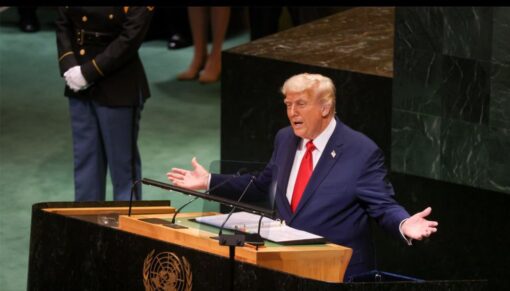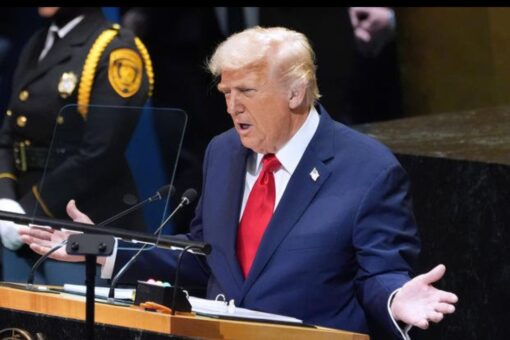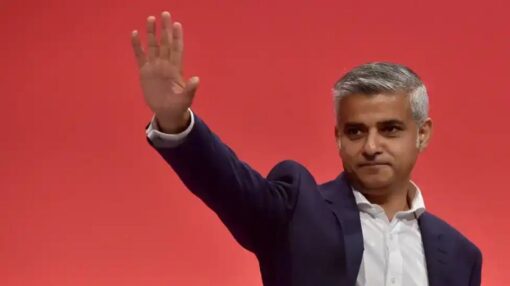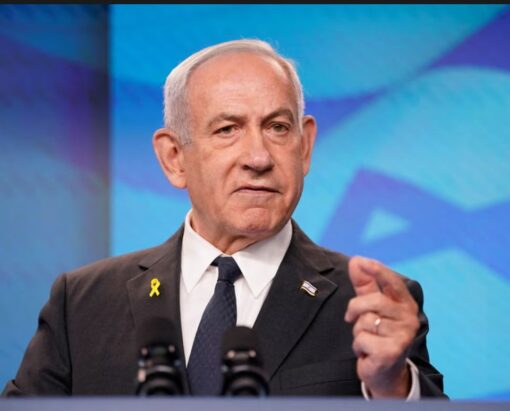President Donald Trump delivered a forceful and uncompromising address to the United Nations General Assembly on September 23, 2025, marking his first appearance at the international forum since resuming office.
Over more than an hour, Trump laid out a vision of global diplomacy that sharply criticized international institutions, immigration policies, and climate initiatives, while asserting America’s “America First” foreign policy.
A significant portion of Trump’s speech focused on immigration, particularly the challenges he perceives in Europe.
He warned that uncontrolled migration was “destroying your heritage” and leading to national decline. Trump urged European nations to abandon open-border policies and take decisive action against illegal migration.
He accused the UN of promoting a “globalist migration agenda” that undermines Western societies, framing immigration as not only a domestic problem but a threat to cultural and national identity.
Turning to climate and energy, Trump dismissed global climate change initiatives as “the greatest con job” in the world. He criticized international efforts to reduce carbon emissions, claiming these policies hurt economic growth and stifle development.

Trump outlined his administration’s energy policy, emphasizing fossil fuel and nuclear energy development over renewable sources, arguing that energy independence is critical for national security.
He warned that nations prioritizing green policies over energy security could face economic setbacks, urging a return to “realistic energy solutions” that serve both jobs and security.
The speech also touched on Middle Eastern issues, with Trump rejecting growing international recognition of a Palestinian state. He argued that granting recognition to Palestine would reward violent actors and undermine efforts to broker peace in the region.
Trump reiterated full U.S. support for Israel while cautioning that unilateral actions by other countries could destabilize the region and make negotiations more difficult. His remarks highlighted a steadfast commitment to Israel and a rejection of what he described as “external pressure to concede to extremists.”
Trump devoted considerable attention to the conflict in Ukraine, warning Russia against further aggression. He announced potential tariffs and economic sanctions if Russia continued its military operations, while urging European allies to join the United States in coordinated measures.
Trump criticized NATO members for continuing to purchase Russian energy, saying it “undermines every effort to hold Russia accountable” and prolongs the conflict.
He called on Europe to adopt a more unified stance against Moscow, arguing that strong, coordinated action could force Russia to reconsider its actions in Ukraine and reduce civilian suffering.
Trump stressed the importance of a robust defense strategy for the U.S. and its allies, emphasizing that America would not hesitate to protect its interests or those of its partners. He described military preparedness and technological superiority as essential tools for deterring adversaries like Russia.
Trump said, “We will always stand ready to defend our people, our allies, and our values. Weakness invites aggression, and strength ensures peace.” These comments underscored his administration’s assertive approach to national security and international conflict.
In addressing Russia, Trump sought to balance deterrence with diplomacy. He acknowledged the importance of engaging Moscow in negotiations but insisted that meaningful talks require accountability and consequences for violations of international law.
Trump’s focus on sanctions and energy strategy reflected a desire to pressure Russia economically while limiting the impact on U.S. energy independence. He warned that continued European reliance on Russian energy not only finances aggression but jeopardizes regional security.
Trump also challenged multilateral institutions, including the United Nations, accusing them of failing to effectively address global crises. He argued that the UN often prioritizes bureaucracy over action, leaving nations to deal with threats on their own.
Trump emphasized the need for reforms, urging the international community to prioritize security, accountability, and results rather than rhetoric. He warned that ineffective global governance emboldens aggressors like Russia and undermines peace efforts in volatile regions.
The president’s remarks on Ukraine also highlighted the human toll of conflict. He spoke about displaced civilians, destruction of infrastructure, and the psychological impact on families living under constant threat.
Trump framed U.S. policy as focused on alleviating suffering while compelling aggressors to cease hostilities. He described sanctions as “a tool to bring leaders to the table, to protect civilians, and to restore stability” and emphasized that America would not shy away from taking decisive steps to end the war.
Trump’s speech further addressed NATO, insisting that European allies increase defense spending and act collectively in response to threats from Russia.
He criticized nations that rely on American military support while continuing to engage economically with Moscow, arguing that this undermines the alliance.
By holding Europe accountable for both defense and economic alignment, Trump sought to strengthen NATO’s credibility while reinforcing U.S. influence in strategic decision-making.
While international institutions, climate policies, and immigration were central topics, the Russia-Ukraine conflict dominated much of Trump’s address. He described the situation as a test of international resolve, emphasizing that inaction would embolden aggressors and prolong conflict.
Trump warned that failure to act decisively against Russia could set a precedent for other nations to disregard international norms, creating a more dangerous world.
Throughout the speech, Trump repeatedly returned to the theme of American leadership. He asserted that the United States would pursue policies that protect national interests, uphold sovereignty, and ensure economic and military strength.
He framed this approach as both practical and moral, insisting that nations that prioritize their own security are better equipped to contribute to global stability.
Trump’s remarks concluded with a call for pragmatic international cooperation. While critical of the UN, NATO, and climate initiatives, he emphasized the importance of alliances when mutual interests are clear.
He highlighted areas where the U.S. is willing to collaborate, such as humanitarian aid, counterterrorism, and responsible energy development, but only when these efforts respect national sovereignty and do not compromise security or economic priorities.
The address left no doubt that Trump’s approach to the UN and global diplomacy would remain confrontational yet strategic.
He combined sharp criticism of international institutions and foreign policy failures with a firm warning to Russia, an assertive defense of U.S. allies, and a clear message that immigration and climate policy would be driven by American priorities.
His rhetoric suggested that America would continue to play a dominant role on the world stage but on its own terms, holding other nations accountable while seeking pragmatic partnerships.
Observers noted that Trump’s UN speech set a tone for U.S. foreign policy in the months ahead. By linking immigration, climate skepticism, and the Russia-Ukraine conflict in a single address, he painted a comprehensive picture of America’s global priorities under his leadership.
His emphasis on sanctions, energy independence, and military preparedness demonstrated a continued focus on strategic leverage, particularly in Europe and Eastern Europe.

In closing, President Trump reaffirmed that America will not compromise on security, sovereignty, or the wellbeing of its citizens. He warned that nations that ignore threats or fail to align their policies with collective security imperatives would face consequences.
Trump’s speech represented both a rebuke to perceived global inefficiencies and a blueprint for a more assertive, self-interested, yet strategically engaged U.S. foreign policy.
The UN address solidified Trump’s stance on key international issues, particularly the ongoing conflict in Ukraine, while reinforcing his “America First” approach to global diplomacy, economic policy, and security.
By confronting Russia, critiquing multilateral institutions, and advocating strict immigration and energy policies, Trump delivered a message that was both unapologetic and unyielding—a reflection of his vision for America’s role in the 21st-century world order.


